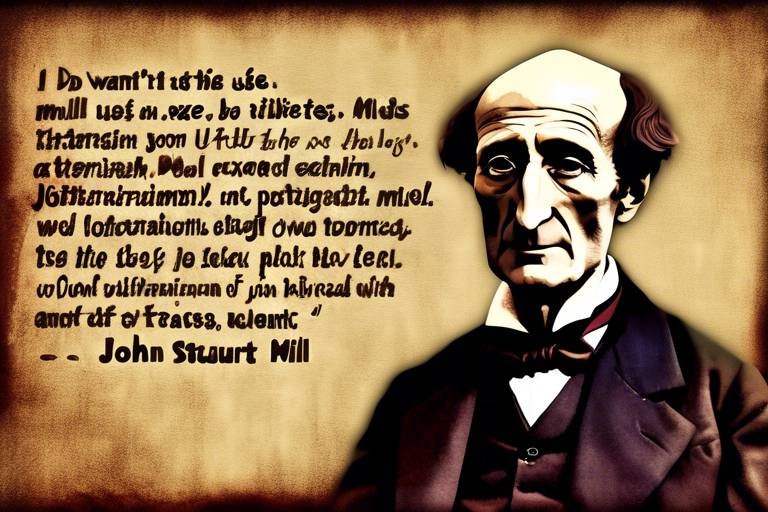Rediscovering Frege - Insights into His Philosophy of Language
Gottlob Frege, often hailed as the father of modern logic, made profound contributions to the philosophy of language that continue to resonate in today's discussions. His innovative ideas about meaning, reference, and the structure of language have shaped not only the field of philosophy but also the realms of linguistics and cognitive science. In a world where communication is paramount, understanding Frege's insights can illuminate the complexities of how we convey thoughts and ideas. Have you ever pondered how a simple word can carry multiple meanings depending on its context? Frege's work provides a framework for exploring such nuances, inviting us to delve deeper into the very fabric of language.
Frege's theories challenge us to rethink our assumptions about language. For instance, when we say "the morning star" and "the evening star," we might think we're referring to two different entities. However, Frege would argue that they share the same reference—namely, Venus—but possess distinct senses, or modes of presentation. This distinction is not just a philosophical curiosity; it has real implications for how we understand identity, truth, and meaning in our everyday conversations. By rediscovering Frege, we are not merely revisiting old ideas; we are engaging with concepts that have shaped the way we think about language and its role in human thought.
As we navigate through this exploration of Frege's philosophy, we will uncover the significance of his work, the crucial distinction between sense and reference, and how these concepts have influenced modern analytic philosophy. Frege's ideas serve as a cornerstone for contemporary discussions in semantics and syntax, making them essential for anyone interested in the intricate dance of language and meaning. So, are you ready to embark on this intellectual journey? Let’s dive into the world of Frege and unravel the complexities of his philosophical contributions!

The Significance of Frege's Work
Gottlob Frege's contributions to the philosophy of language are nothing short of revolutionary. His work has laid the foundation for modern logic and linguistic theory, impacting not only philosophers but also mathematicians and linguists alike. By meticulously dissecting the components of language, Frege opened the door to a deeper understanding of how we communicate and interpret meaning. His ideas resonate through the corridors of contemporary philosophy, influencing prominent thinkers such as Bertrand Russell and Ludwig Wittgenstein, who built upon his insights to further explore the intricacies of language.
One cannot overstate the importance of Frege's distinction between sense and reference, which serves as a cornerstone for modern semantics. This distinction is crucial for unpacking how language operates at various levels, from everyday conversation to complex philosophical discourse. Frege's work allows us to navigate the murky waters of meaning, providing clarity in a realm often clouded by ambiguity. Understanding Frege's theories equips us with the tools to tackle contemporary discussions on semantics and syntax, making his work not just historically significant but also relevant in today's linguistic landscape.
Moreover, Frege's influence extends beyond the realm of philosophy into the practical applications of language. His ideas have permeated fields such as computer science, where understanding the semantics of programming languages is essential. In essence, Frege's work serves as a bridge connecting theoretical philosophy with practical applications, illustrating how abstract concepts can have tangible effects in various domains.
To truly grasp the significance of Frege's contributions, one must consider the following key aspects:
- Foundation of Modern Logic: Frege's work established a formal system that has become a bedrock for logical analysis.
- Influence on Analytic Philosophy: His ideas catalyzed the development of analytic philosophy, shaping the discourse of the 20th century.
- Impact on Linguistics: Frege's insights into meaning and reference continue to inform linguistic theory and semantic analysis.
In summary, Frege's work is not merely a chapter in the history of philosophy; it is a living legacy that continues to influence and inspire. By engaging with his ideas, we can better understand the complexities of language and thought, allowing us to appreciate the profound connections between words and the world they represent.

Frege's Distinction Between Sense and Reference
Gottlob Frege's distinction between sense (Sinn) and reference (Bedeutung) is not just a theoretical framework; it's a lens through which we can understand the intricate dance of language and meaning. Imagine you’re at a party, and someone mentions "the morning star" and "the evening star." At first glance, these phrases refer to the same celestial body—Venus. However, Frege argues that they carry different senses. The sense of "the morning star" involves the experience of seeing Venus in the early hours, while "the evening star" evokes the image of Venus at dusk. This distinction is crucial because it highlights how our understanding of language is shaped by context and perception.
To delve deeper into this concept, let's consider how sense and reference function in our daily communication. When we say, "I saw the president," the reference is clear; it points to a specific individual who holds the office. However, the sense of this statement can vary widely depending on who you are and your perspective on the president. For some, it might evoke admiration, while for others, it could stir feelings of opposition. This subtlety in meaning illustrates how language is not merely a vehicle for conveying information but a complex system that reflects our thoughts, emotions, and social contexts.
Frege's insight prompts us to ask: How does this distinction affect our understanding of identity statements? Take the example of "Clark Kent is Superman." Here, the reference is the same individual, yet the senses differ greatly. For someone who knows Clark Kent only as a mild-mannered reporter, the statement may hold a different weight than for someone familiar with his superhero identity. In this way, Frege's theory reveals the layers of meaning that can exist within seemingly straightforward statements.
Moreover, Frege's distinction has significant implications for the field of semantic theory. It encourages linguists and philosophers alike to explore how meaning is constructed beyond mere reference. The ongoing relevance of Frege's ideas can be seen in contemporary discussions about semantics, where scholars grapple with questions of how context influences meaning and how our understanding of language can evolve over time. In essence, Frege's work invites us to reconsider the very foundations of how we communicate and understand one another.
In summary, Frege's distinction between sense and reference is not merely an academic exercise; it's a profound insight into the nature of language itself. By recognizing that the same reference can carry different senses, we open the door to a richer understanding of communication, thought, and the intricate relationship between words and the world they describe.

The Role of Sense in Meaning
When we dive into the world of language, one of the most fascinating concepts introduced by Frege is the role of sense in meaning. Imagine you're at a party, and someone mentions a famous movie. The title alone might not be enough; the way they describe it—the sense they convey—shapes your understanding of what they're talking about. This is precisely what Frege meant when he emphasized that the sense of an expression goes beyond mere words; it encompasses the way we present and perceive those words in context.
Frege argued that every expression has a sense, which is essentially the way it is understood by speakers. This means that two expressions can refer to the same object but carry different senses. For instance, consider the phrases "the morning star" and "the evening star." Both refer to the planet Venus, yet they provide different modes of presentation. One evokes the image of Venus as seen in the morning, while the other does so as seen in the evening. This distinction is crucial because it highlights how our understanding of meaning is intricately tied to the context in which language is used.
Furthermore, the notion of sense plays a pivotal role in resolving ambiguities in language. When someone says, "I saw her duck," the sense of the phrase can change dramatically based on the context. Are we talking about a bird, or is it a playful reference to someone lowering their head? Understanding the sense allows us to navigate these complexities effortlessly. It’s like having a map that guides us through the intricate pathways of communication.
To illustrate the impact of sense further, let’s consider some examples:
- Identity Statements: In the statement "Hesperus is Phosphorus," the sense of "Hesperus" (the evening star) and "Phosphorus" (the morning star) leads us to recognize that they refer to the same object, yet the sense provides unique perspectives on that object.
- Metaphorical Language: When someone says, "Time is a thief," the sense of the phrase conveys a deeper meaning about the nature of time and its effects on our lives, rather than suggesting that time literally steals.
As we explore the implications of Frege's theory of sense, we see that it not only enriches our understanding of language but also influences how we engage with philosophical discussions about meaning. The interplay between sense and reference allows us to appreciate the nuances of communication, revealing that meaning is not a straightforward concept but a complex tapestry woven from context, intention, and perception.
Ultimately, Frege's insights into the role of sense in meaning challenge us to think critically about how we communicate. It encourages us to look beyond the surface of language and consider the deeper implications of what we say and how we say it. This understanding is not just academic; it’s a vital skill in our everyday interactions, shaping how we connect with others and interpret the world around us.
- What is the difference between sense and reference? Sense refers to the way an expression is understood, while reference is the actual object or concept that the expression denotes.
- Why is Frege's distinction important? It helps clarify how language conveys meaning and addresses issues of ambiguity in communication.
- How does sense influence our understanding of identity statements? Sense allows us to recognize that different expressions can refer to the same object while providing distinct perspectives on it.
- Can you give an example of sense in everyday language? Yes! The phrases "the capital of France" and "the city of lights" both refer to Paris but evoke different senses based on context.

Examples of Sense in Everyday Language
Understanding Frege's distinction between sense and reference can be a bit like trying to differentiate between the melody and the lyrics of a song. The melody—the sense—gives the tune its unique flavor, while the lyrics—the reference—anchor it in specific meaning. To illustrate this concept in everyday language, let’s consider some practical examples that highlight how context can shape our understanding of expressions.
Take the phrase "the morning star" and "the evening star". At first glance, they seem to refer to different entities. However, both expressions actually refer to the planet Venus. The sense of each phrase differs based on when you encounter it—one in the morning and the other in the evening. This distinction is crucial because it shows how language can convey different meanings even when the reference is the same. The context in which we use these phrases shapes our understanding and interpretation.
Another example can be found in the expression "President of the United States." The sense of this title can vary significantly depending on the time period in question. For instance, when someone refers to the President in 2020, they may be thinking of Donald Trump, while in 2024, the reference could shift to Joe Biden or another individual. Here, the sense encompasses not only the title but also the implications of leadership, policies, and the socio-political climate of the time. It emphasizes that understanding language is not just about the words themselves but also the layers of meaning that accompany them.
In everyday conversations, we often encounter phrases that can lead to misunderstandings if the sense is not clear. For example, consider the statement: "He is a real shark in the business world." While the reference here might point to a successful businessman, the sense implies a predatory nature, suggesting that he is aggressive and cunning in his dealings. If someone were to take this phrase literally, they might be confused about its intent. This highlights the importance of context and how our interpretation of sense can guide our understanding of language.
To further clarify, let’s summarize some key points regarding the examples of sense in everyday language:
- Context Matters: The surrounding context plays a pivotal role in shaping the sense of an expression.
- Multiple Meanings: A single reference can have multiple senses based on different contexts, as seen with "the morning star" and "the evening star."
- Implications of Language: Phrases can carry deeper meanings beyond their literal references, demonstrating the richness of language.
These examples underscore Frege's assertion that the sense of an expression is vital for understanding its meaning. By recognizing how language operates in everyday situations, we can appreciate the intricate dance between sense and reference, making our communication more effective and nuanced.

Implications for Semantic Theory
Gottlob Frege's groundbreaking distinction between sense and reference has far-reaching implications for semantic theory. By emphasizing that the meaning of an expression is not merely tied to its reference, but also to its sense, Frege opened the door to a more nuanced understanding of language. This dual-layered perspective is crucial for linguists and philosophers alike, as it allows for a deeper exploration of how we communicate and understand meaning.
In modern semantic theory, Frege's ideas have influenced various approaches to understanding meaning. For instance, consider how context can radically alter the sense of a statement. When we say, "The morning star is the evening star," we are not merely identifying two celestial bodies; we are navigating through layers of meaning that inform our understanding of identity and existence. This example illustrates how sense can shape our perception, guiding us through the complexities of language.
Moreover, Frege's insights challenge the simplistic view of reference as a direct relationship between words and the world. Instead, his framework suggests that meaning is mediated through cognitive processes and social interactions. This has significant implications for fields such as linguistics, philosophy of language, and even artificial intelligence, where understanding the subtleties of meaning is essential for effective communication and reasoning.
To further illustrate the implications of Frege's theories, let's consider a table that summarizes the contrast between sense and reference:
| Aspect | Sense (Sinn) | Reference (Bedeutung) |
|---|---|---|
| Definition | The mode of presentation of an expression | The actual object or concept the expression refers to |
| Role in Meaning | Shapes how we understand and interpret language | Connects language to the external world |
| Example | "The morning star" vs "The evening star" | Both refer to the planet Venus |
In conclusion, Frege's contributions to semantic theory are not just historical footnotes; they are vital to ongoing discussions in philosophy and linguistics. By recognizing the interplay between sense and reference, we gain valuable insights into how language functions, paving the way for more sophisticated theories of meaning. As we continue to explore the depths of language, Frege's legacy remains a guiding light, illuminating the intricate web of communication that defines human interaction.
- What is the difference between sense and reference?
Sense refers to the way in which an expression presents its meaning, while reference pertains to the actual object or concept that the expression denotes. - Why is Frege's work important in modern linguistics?
Frege's theories provide a foundational understanding of meaning that influences contemporary approaches to semantics, syntax, and the philosophy of language. - How did Frege influence later philosophers?
Frege's ideas laid the groundwork for significant developments in analytic philosophy, impacting notable figures like Bertrand Russell and Saul Kripke.

The Importance of Reference
When we talk about language, we often think about the words we use and the meanings they convey. However, the concept of reference takes us deeper into the relationship between language and the world around us. Frege emphasized that reference is not just about the words themselves; it’s about how those words connect to the actual objects or concepts they denote. This connection is crucial for understanding how we communicate and think.
To put it simply, reference is the bridge between our language and reality. Imagine you’re at a party, and someone mentions "the tallest person in the room." Instantly, your mind conjures up an image of that specific individual. The word "tallest" refers directly to a particular person, making the reference clear and effective. Without this reference, language would be a jumble of sounds with no real meaning. Frege’s exploration of reference sheds light on how we navigate these connections in our daily lives.
Frege argued that understanding reference is vital for grasping how language functions. He proposed that each expression has a reference, which is the actual object it points to in the world. For instance, the term "Venus" refers to the second planet from the sun. This clear linkage helps us communicate complex ideas efficiently. However, Frege also noted that reference can be tricky, especially in cases of identity statements. For example, when we say "Mark Twain is Samuel Clemens," the reference remains the same, but our understanding of the two names might differ due to their distinct senses.
Moreover, Frege's insights into reference have profound implications for various fields:
- Philosophy: It challenges us to think about how we define and understand identity.
- Linguistics: It provides a framework for analyzing how different languages express reference.
- Logic: It aids in developing formal systems that accurately reflect our understanding of language connections.
In summary, Frege's emphasis on reference not only highlights its importance in everyday language but also underscores its role in shaping our thoughts and perceptions. By recognizing the significance of reference, we can better appreciate the complexities of communication and the intricate dance between words and their meanings.
- What is the difference between sense and reference?
Sense relates to the meaning or mode of presentation of an expression, while reference pertains to the actual object or concept that the expression denotes.
- Why is reference important in language?
Reference is crucial as it connects words to the real world, allowing us to communicate effectively and convey complex ideas.
- How did Frege influence modern philosophy?
Frege's work laid the groundwork for analytic philosophy and has influenced numerous philosophers in their exploration of language and meaning.

Frege's Influence on Analytic Philosophy
Gottlob Frege's contributions to philosophy have been nothing short of revolutionary, particularly in the realm of analytic philosophy. His groundbreaking ideas about language, logic, and meaning laid the foundation for a new way of thinking that reshaped the landscape of 20th-century philosophy. Frege's influence can be seen in the works of many prominent philosophers who followed him, including Bertrand Russell, Ludwig Wittgenstein, and Saul Kripke. These thinkers built upon Frege's insights, further developing the field of philosophy of language and pushing the boundaries of our understanding of meaning.
One of the most significant aspects of Frege's impact is his emphasis on the precision of language and the logical structure underlying it. He argued that ordinary language often obscures the logical relationships between concepts, which can lead to misunderstandings and confusion. By introducing formal logic as a tool for analyzing language, Frege set the stage for subsequent philosophers to explore the intricate connections between language, thought, and reality. This shift towards a more rigorous analysis of language is a hallmark of analytic philosophy.
Frege's distinction between sense and reference has been particularly influential. This distinction allowed later philosophers to address complex questions regarding identity statements, propositional attitudes, and the nature of truth. For instance, consider the famous example of the morning star and the evening star, which are two different expressions that refer to the same object: Venus. Frege's insights into how these expressions convey different senses while sharing the same reference opened up new avenues for exploring the nuances of meaning in language.
Furthermore, Frege's work on the foundations of mathematics, especially in his book Begriffsschrift, has had a lasting impact on the philosophy of mathematics. His belief that mathematical truths are objective and independent of human thought influenced later philosophers such as Russell and Wittgenstein, who grappled with the implications of Frege's ideas for understanding mathematical language and its relationship to reality. The debate over the nature of mathematical objects and the meaning of mathematical statements continues to be a vibrant area of inquiry, demonstrating Frege's lasting legacy.
To illustrate Frege's influence, consider the following table summarizing key philosophers and their connections to Frege's ideas:
| Philosopher | Connection to Frege |
|---|---|
| Bertrand Russell | Built on Frege's logicist project, exploring the foundations of mathematics. |
| Ludwig Wittgenstein | Engaged with Frege's ideas on meaning and reference in his own work on language. |
| Saul Kripke | Challenged and expanded Frege's notions of reference through his theory of naming. |
Despite the profound influence Frege has had, it's essential to acknowledge that his theories have not gone unchallenged. Philosophers have raised various critiques regarding the applicability of his ideas in contemporary discussions on language and meaning. For example, some argue that Frege's strict separation of sense and reference does not adequately account for the complexities of natural language. Others have pointed out that the context in which language is used plays a crucial role in shaping meaning, a nuance that Frege's framework might overlook.
In conclusion, Frege's influence on analytic philosophy is both profound and enduring. His ideas continue to resonate in contemporary discussions about language, logic, and meaning, and they provide a critical foundation for understanding the evolution of philosophical thought in the 20th century and beyond. As we delve deeper into the intricacies of language and its relationship to thought and reality, Frege's work remains a guiding light, illuminating the path for future inquiries.
- What is Frege's main contribution to philosophy?
Frege's main contribution lies in his analysis of language, particularly his distinction between sense and reference, which has had a lasting impact on the philosophy of language and logic. - How did Frege influence later philosophers?
Frege's ideas influenced many later philosophers, including Russell and Wittgenstein, who built upon his insights to explore the nature of meaning and the foundations of mathematics. - What challenges did Frege's theories face?
Frege's theories have faced criticism regarding their applicability to natural language and the complexities of meaning that arise from context and usage.

Connections to Later Philosophers
Gottlob Frege's impact on philosophy, particularly in the realm of language, cannot be overstated. His revolutionary ideas laid the foundation for many thinkers who followed in his footsteps. For instance, Bertand Russell, often referred to as the father of analytic philosophy, adopted Frege's distinction between sense and reference, but he also critiqued and expanded upon these concepts in his own work. Russell's theory of descriptions, which addresses how we refer to non-existent entities, can be seen as a direct response to Frege's ideas, showcasing the dynamic interplay between their philosophies.
Another significant figure influenced by Frege is Saul Kripke. Kripke's work on naming and necessity challenged some of Frege's notions, particularly regarding the rigidity of reference. He introduced the idea that names can refer to the same object in different possible worlds, which adds a layer of complexity to the understanding of reference that Frege had not anticipated. This development has profound implications for modal logic and the philosophy of language, illustrating how Frege's groundwork continues to inspire and provoke debate among contemporary philosophers.
Moreover, the connections to later philosophers extend beyond just Russell and Kripke. Thinkers such as Ludwig Wittgenstein were also deeply influenced by Frege's ideas. Wittgenstein's early work, particularly in the Tractatus Logico-Philosophicus, reflects Fregean themes, such as the relationship between language and reality. However, Wittgenstein diverged from Frege by suggesting that the meaning of a word is not merely tied to a fixed reference but is also shaped by its use in various contexts. This notion of contextual meaning further enriches the dialogue surrounding Frege's legacy and highlights the evolution of thought in analytic philosophy.
To better illustrate these connections, consider the following table that summarizes the key philosophers influenced by Frege and their main contributions:
| Philosopher | Key Contributions |
|---|---|
| Bertand Russell | Developed the theory of descriptions, addressing how we refer to non-existent entities. |
| Saul Kripke | Introduced the concept of rigid designators, challenging Frege's views on reference. |
| Ludwig Wittgenstein | Proposed that meaning is determined by use, diverging from Frege's fixed reference idea. |
In summary, Frege's philosophy has woven a rich tapestry of thought that has influenced a diverse range of philosophers. Each of these thinkers has taken Frege's initial insights and either built upon them or challenged them, creating a vibrant and ongoing dialogue in the philosophy of language. As we continue to explore these connections, it becomes clear that Frege's legacy is not just a historical footnote but a living part of contemporary philosophical discourse.

Challenges to Frege's Theories
While Gottlob Frege's contributions to the philosophy of language are undeniably profound, they have not been without their challenges. Critics have raised various objections to his theories, particularly concerning the distinctions he made between sense and reference. One significant critique comes from the realm of contextualism, which posits that the meaning of words can shift dramatically depending on the context in which they are used. This perspective argues that Frege's rigid separation of sense and reference fails to account for the fluidity of language in real-world situations.
Another challenge arises from the work of Kripke and his theory of direct reference. Kripke contended that names do not have a descriptive content that corresponds to Frege's sense; instead, they refer directly to objects in the world. This theory suggests that the meaning of a name is not dependent on the sense associated with it, but rather on the actual object it designates. Such a view raises questions about the adequacy of Frege's framework when it comes to understanding the semantics of proper names and identity statements.
Moreover, Frege's notion of identity statements has also faced scrutiny. For instance, the statement "Hesperus is Phosphorus" (referring to the evening star and the morning star) exemplifies a challenge. According to Frege, while both terms refer to the same object, they possess different senses. Critics argue that this leads to a puzzling conclusion: if the terms have different senses, how can the statement be true? This issue has led to further debates regarding the nature of identity and how it is represented in language.
Additionally, some scholars have pointed out that Frege's theories may struggle to accommodate the complexities of natural language. For instance, the phenomenon of indexicals—words like "I," "here," and "now"—poses a significant challenge to his framework. These terms rely heavily on context for their meaning, suggesting that a more dynamic approach to semantics might be necessary. Critics argue that Frege's static model of sense and reference cannot adequately capture the nuances of how language functions in everyday communication.
Despite these challenges, Frege's work remains a cornerstone of philosophical inquiry. The very criticisms he faces have sparked rich discussions and further developments in the field, demonstrating that while his theories may have limitations, they also provide a fertile ground for ongoing exploration. The debates surrounding Frege's ideas highlight the evolving nature of language philosophy and underscore the importance of critical engagement with foundational theories.
- What is Frege's main contribution to the philosophy of language?
Frege's main contribution is his distinction between sense and reference, which has significantly influenced how philosophers and linguists think about meaning. - How do Kripke's ideas challenge Frege's theories?
Kripke's theory of direct reference argues that names refer directly to objects, challenging Frege's idea that names have a descriptive sense associated with them. - What are indexicals, and why do they pose a challenge to Frege?
Indexicals are terms that depend on context for their meaning, which complicates Frege's static model of sense and reference. - Why is Frege still relevant today?
Frege's ideas continue to spark discussion and development in the philosophy of language, making them essential for understanding contemporary semantic theory.
Frequently Asked Questions
- What is the main contribution of Gottlob Frege to philosophy?
Gottlob Frege is considered the father of modern logic and made significant contributions to the philosophy of language. His work laid the groundwork for understanding how meaning and reference function in language, influencing many later philosophers and the field of linguistics.
- What is the difference between sense and reference according to Frege?
Frege distinguished between 'sense' (Sinn) and 'reference' (Bedeutung). Sense refers to the way in which a term presents its meaning, while reference is the actual object or concept that the term points to. This distinction is crucial for understanding how language conveys meaning and identity.
- How does Frege's distinction affect our understanding of identity statements?
Frege's distinction helps clarify why identity statements can be informative or non-informative. For example, saying "the morning star is the evening star" reveals that while both terms refer to the same object (the planet Venus), they present different senses, leading to different implications in context.
- Can you provide an example of sense in everyday language?
Sure! Consider the phrase "the President." Depending on the context, this could refer to different individuals (e.g., Joe Biden or Donald Trump). The sense of the expression changes based on how we understand and present that title in conversation.
- What are the implications of Frege's theories for modern semantic theory?
Frege's ideas about sense and reference have profound implications for contemporary semantic theory. They encourage deeper exploration into how meaning is constructed and understood, influencing debates on language, communication, and the nature of reality.
- How did Frege influence analytic philosophy?
Frege's work was pivotal in shaping analytic philosophy, particularly in the 20th century. His focus on language and logic influenced philosophers like Bertrand Russell and Ludwig Wittgenstein, leading to new ways of thinking about philosophical problems.
- Who are some philosophers that were influenced by Frege?
Frege's ideas had a lasting impact on many philosophers, including Bertrand Russell, who expanded on Frege's logic, and Saul Kripke, who explored issues of reference and necessity. These connections illustrate the evolution of philosophical thought stemming from Frege's foundational work.
- What challenges have Frege's theories faced?
Despite their influence, Frege's theories have faced criticism, particularly regarding the nature of sense and reference. Some philosophers argue that his distinctions do not adequately account for all linguistic phenomena, prompting ongoing debates in the philosophy of language.



















